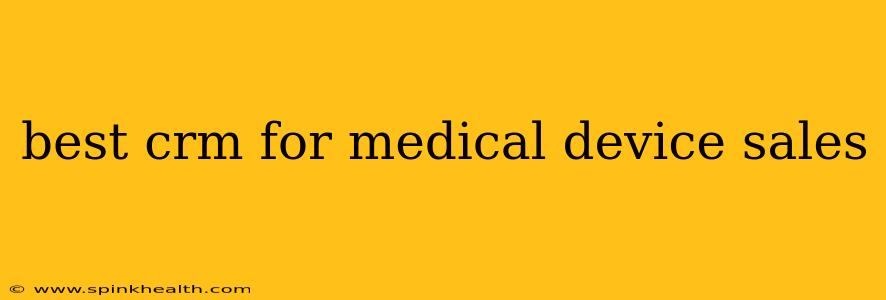Finding the Best CRM for Medical Device Sales: A Sales Rep's Journey
The whirring of the hospital machinery, the hushed tones of doctors in consultation, the quiet satisfaction of closing a deal that could improve countless lives – this is the world of medical device sales. It’s a demanding field, requiring not only deep product knowledge but also the ability to navigate complex regulatory landscapes and build trust with healthcare professionals. And at the heart of it all is a powerful CRM – a tool that can streamline your workflow, enhance your relationships, and ultimately, drive your success. But with so many options available, how do you choose the best CRM for your medical device sales team?
This isn't just about finding software; it's about finding a strategic partner that understands the nuances of your industry. Let's explore the journey of finding that perfect fit.
What Makes a CRM Perfect for Medical Device Sales?
Before diving into specific software, we need to define what we're looking for. A typical CRM might manage contacts and leads, but a medical device CRM needs to handle the unique aspects of this industry, including:
- Strict Regulatory Compliance: Data security and adherence to HIPAA and other regulations are paramount. The CRM needs to be built with security at its core.
- Complex Sales Cycles: Medical device sales often involve multiple stakeholders, lengthy approval processes, and detailed documentation. The CRM must manage these complexities effectively.
- Detailed Product Information: Tracking specific device models, configurations, and associated documentation is crucial.
- Integration with Other Systems: Seamless integration with existing systems (e.g., ERP, marketing automation) is essential for streamlined workflows.
- Reporting and Analytics: Data-driven insights into sales performance, pipeline management, and customer behavior are vital for strategic decision-making.
What are the Best CRM Options for Medical Device Sales? (Exploring Different CRM Types)
Choosing the "best" CRM is subjective and depends on your specific needs and budget. However, several CRM platforms stand out for their suitability in the medical device industry. These often fall into categories:
- Enterprise-Level CRMs: These are robust, scalable solutions designed for large organizations with complex needs. They often come with a high price tag but offer extensive features and customization options. Examples include Salesforce, Microsoft Dynamics 365, and Oracle Siebel.
- Mid-Market CRMs: These solutions offer a balance between functionality and affordability, making them suitable for medium-sized businesses. Examples include HubSpot, Zoho CRM, and Pipedrive.
- Specialized CRMs for Healthcare: Some CRMs are specifically tailored to the healthcare industry, incorporating features such as HIPAA compliance and integrated patient data management.
Remember, the best CRM is not necessarily the most expensive or feature-rich. It's the one that aligns perfectly with your sales processes, budget, and team's technical expertise.
What Features Should I Prioritize?
This is where things get really specific to your needs. Let's explore some key features, answering common questions:
1. How do I ensure HIPAA compliance with my chosen CRM?
HIPAA compliance is non-negotiable. Look for CRMs that explicitly state their HIPAA compliance, offer robust security features (encryption, access controls), and provide documentation to support their claims. Don't just take their word for it; investigate thoroughly.
2. How can a CRM help me manage complex sales cycles involving multiple stakeholders?
A strong CRM will allow you to map the sales process, track interactions with each stakeholder, and easily share relevant information. Features like opportunity management, collaborative tools, and customizable workflows are vital here.
3. How can a CRM improve my reporting and analytics capabilities?
Look for CRM systems with robust reporting and analytics dashboards. These should allow you to track key performance indicators (KPIs), identify trends, and make data-driven decisions to optimize your sales strategy.
4. What kind of integration capabilities should I look for?
Seamless integration with your existing systems (e.g., ERP, marketing automation) is crucial to avoid data silos and streamline workflows. Check for API integrations or pre-built connectors for the systems you use.
5. How can a CRM help with lead generation and qualification in the medical device industry?
Many CRMs offer marketing automation features that can help you nurture leads, segment your audience, and track engagement. This is crucial for efficiently qualifying leads.
Choosing the right CRM is an investment in your future success. By carefully considering your needs, evaluating available options, and prioritizing key features, you can find the perfect partner to help you navigate the complexities of medical device sales and achieve your goals. Remember, the journey to finding the right CRM is as crucial as the destination itself. Take your time, ask questions, and choose wisely.

